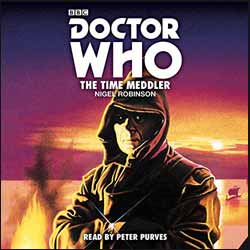|
Click here to return to the main site. Audio Book Review
When the TARDIS materialises on an apparently deserted Northumbrian beach, Steven disputes the Doctor’s claim that they have travelled back to the eleventh century. The discovery of a modern wristwatch in a nearby forest merely reinforces his opinion. But this is 1066, the most important date in English history, and the Doctor’s arrival has not gone unnoticed. Observing the appearance of the TARDIS is a mysterious monk, who recognises the time machine for what it is. He also knows that the Doctor poses a serious threat to his master plan – a plan which, if successful, could alter the future of the entire world... This is an unabridged reading of Nigel Robinson’s 1987 novelisation of the 1965 serial written by Dennis Spooner – a story that may seem quaint now, but was revolutionary at the time. Prior to The Time Meddler, there had been two main genres of Doctor Who story: science fiction (in a futuristic or alien setting) and historical (with no science-fiction elements apart from the TARDIS and its crew). Never the twain did meet until this jolly adventure, in which (spoiler alert!) another time traveller attempted to interfere in the course of history during the pivotal year of 1066. The so-called pseudo-historical was born, and within a couple of years it would completely phase out the historical genre. Even more radical (spoiler alert again!) was the notion that the eponymous rival time traveller, the mischievous Monk, was a member of the Doctor’s own race and possessed a TARDIS of his own – though the terms ‘Time Lord’ and ‘Gallifrey’ were still several years in the future. Also rocking the boat was the arrival of a new companion, in the form of space pilot Steven Taylor (played by Peter Purves, who narrates this audio book). Ian and Barbara had left at the end of the previous serial, The Chase, so now the only remaining member of the original TARDIS crew was the Doctor himself. Steven stirs up what had been a cosy camaraderie aboard the ship by pouring scorn upon the assertion that he has travelled back in time (a scientific feat which seems impossible even in his home era of the 23rd century). He would become more open-minded in due course, but Purves appears to relish recapturing the really sarky early Steven. Novelist Nigel Robinson adds an effective prologue depicting the moments leading up to Steven boarding the TARDIS at the end of The Chase, as well as an epilogue featuring the Monk. He also describes the inner musings of various characters during moments when there was no dialogue on screen (this is particularly effective when the Monk looks down from a clifftop at the newly arrived TARDIS and later approaches the vehicle) and, during a surprisingly grim sequence, leaves us in no doubt as to the severity of the Vikings’ attack upon the local villager Edith (another character who comes across well here). Unlike the Monk, however, Robinson is no meddler. He allows the strengths of Dennis Spooner’s original scripts to shine through whenever possible, retaining dialogue gems such as “Up there is the scanner, those are the doors, that is a chair with a panda on it. Sheer poetry, dear boy!” and “What do you think it is, a space helmet for a cow?” Occasionally, Purves’ reading of the Monk’s lines sounds very similar to his Doctor voice, but a nice little detail that he adds is the fact that the Saxon villagers speak with Northumbrian (i.e. Geordie) accents, in contrast to the Received Pronunciation that had been favoured by the BBC back in 1965. So, while not a historical, The Time Meddler is itself a pivotal piece of Who history, and Spooner, Robinson and Purves all deserve a meddle – sorry, a medal – for their input into this audio presentation. 9 Richard McGinlay Buy this item online
|
|---|

